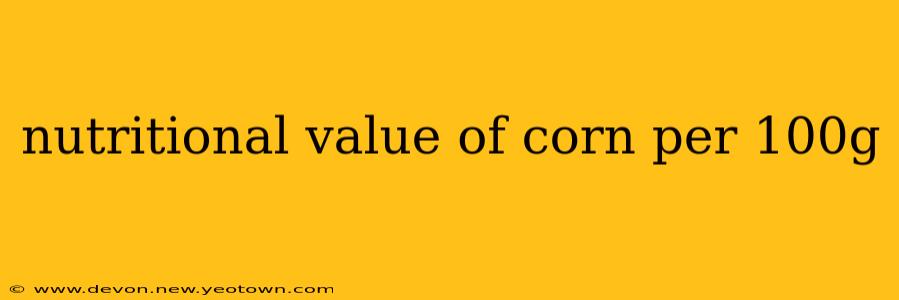Corn, that humble yet versatile stalk of goodness, has been a staple food for millennia. But beyond its delicious taste and culinary versatility, lies a surprisingly rich nutritional profile. Let's delve into the nutritional value packed into a mere 100g of this golden grain. This isn't just about numbers; we'll explore how these nutrients impact your health and well-being.
What are the main nutrients in 100g of corn?
A 100g serving of corn offers a surprisingly balanced mix of nutrients. Think of it as a mini-powerhouse of vitamins, minerals, and carbohydrates. You'll find a good source of carbohydrates, providing energy for your day. It also contributes a decent amount of fiber, aiding digestion and promoting gut health. Beyond that, you'll find various vitamins and minerals, including vitamin C for immunity, vitamin B6 for brain function, and magnesium and phosphorus for bone health and energy production. It's not a superstar in any one nutrient category, but it's a solid contributor across the board. Let's break it down further.
How many calories are in 100g of corn?
This is a frequent question, and understandably so! The calorie count in 100g of corn generally sits around 90-100 calories. This makes it a relatively low-calorie food, especially when considering the nutritional benefits it provides. However, remember that cooking methods can slightly alter the calorie content. Adding butter, salt, or other high-calorie additions will significantly increase the overall calorie count per serving.
Is corn good for weight loss?
This is a more nuanced question. While corn itself isn't particularly high in calories, its glycemic index (GI) is relatively high. This means it can cause a rapid spike in blood sugar levels. For individuals watching their weight, mindful consumption is key. Moderation is essential. Incorporating corn as part of a balanced diet, alongside plenty of other vegetables, fruits, lean protein, and healthy fats, is more likely to contribute positively to weight management goals than relying on it as a primary source of calories. The fiber content, however, can contribute to satiety, helping you feel fuller for longer.
What are the health benefits of eating corn?
Beyond the basic vitamins and minerals, corn offers several health benefits:
- Improved Digestion: The fiber content aids in digestion and prevents constipation.
- Eye Health: Corn contains lutein and zeaxanthin, antioxidants crucial for eye health and reducing the risk of age-related macular degeneration.
- Heart Health: Some studies suggest that corn's fiber and antioxidants may contribute to improved heart health, though more research is ongoing.
- Brain Function: The vitamin B6 content supports brain function and cognitive health.
Is corn a good source of protein?
While corn does contain some protein, it's not a significant source compared to other foods like meat, beans, or lentils. The protein content in 100g of corn is relatively low. It's best to look to other sources for a substantial protein intake.
What are the potential drawbacks of eating too much corn?
While generally healthy, overindulging in corn can lead to some potential drawbacks:
- Blood Sugar Spikes: Its high glycemic index can cause blood sugar spikes, potentially problematic for individuals with diabetes or insulin resistance.
- Phytic Acid: Corn contains phytic acid, which can interfere with mineral absorption. However, this effect is mitigated by soaking or sprouting corn.
Conclusion: Enjoy Corn in Moderation
Corn, in moderation, can be a valuable addition to a healthy and balanced diet. Its rich nutritional profile offers various vitamins, minerals, and fiber, contributing to overall well-being. However, awareness of its high glycemic index and phytic acid content is important for making informed dietary choices. Remember, a varied and balanced diet is key to optimal health, and corn plays a supporting role rather than a starring one.

